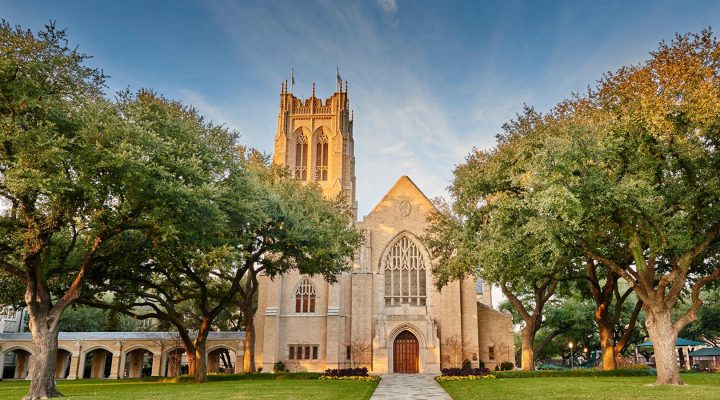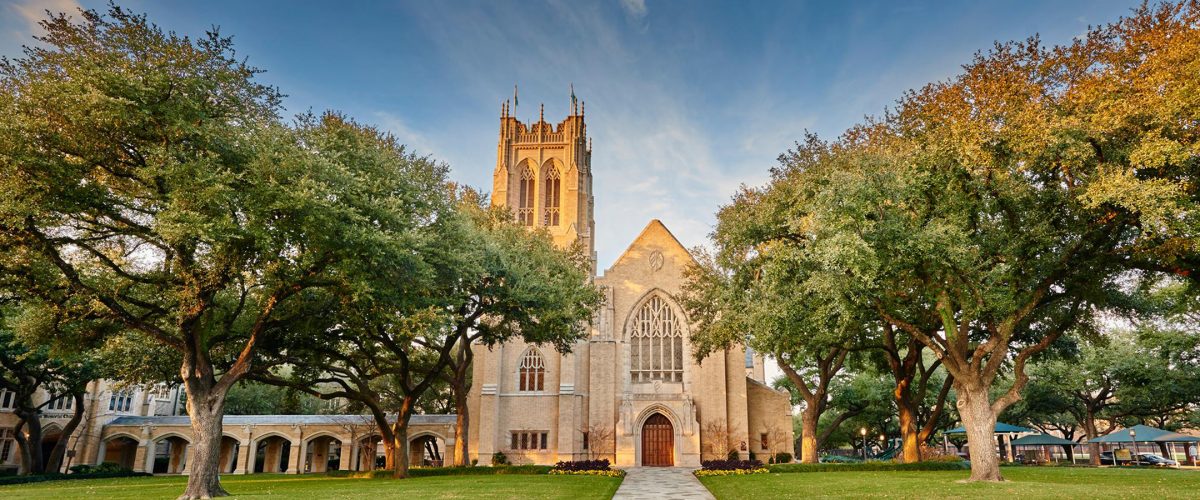Barely a month after a historic meeting that removed half a century of official discrimination against LGBTQ Christians, The United Methodist Church faces new turbulence as homosexuality foes opt out of the worldwide denomination.
General Conference delegates voted in late April and early May to remove the UMC’s bans against ordaining LGBTQ people as clergy, against same-sex weddings in United Methodist churches and against United Methodist pastors conducting same-sex weddings. More importantly, delegates adopted revised Social Principles that eliminated the policy on which all the enforceable church bans were built: “the practice of homosexuality is incompatible with Christian teaching.”
Rumblings against those General Conference decisions began in Charlotte, N.C., while delegates were still conducting business. Now members of one of the UMC’s biggest African regional units have voted to leave the denomination, while another conference ponders its future.
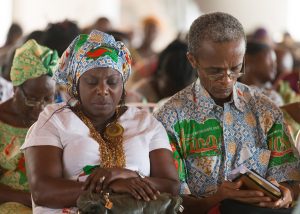
Parishioners pray during worship at Canaan United Methodist Church in Abidjan, Côte d’Ivoire, in February 2018. (Photo by Mike DuBose, UMNS)
According to UM News’ May 28 daily digest, members of the Côte d’Ivoire Conference voted in a special session to leave the UMC. Côte d’Ivoire came provisionally into the denomination in 2004 and its incorporation was ratified in 2008. At last count, it reported more than 1 million members, making it one of the UMC’s largest conferences.
Cote d’Ivoire Bishop Benjamin Boni issued a statement reported by La Croix, an international journal, that “the United Methodist Church now rests on socio-cultural values that have consumed its doctrinal and disciplinary integrity. Legislation does not compel churches.”
At the same time, United Methodists in Zimbabwe have been demonstrating against homosexuality, which is outlawed in their country. News reports there have speculated that the Zimbabwe East and Zimbabwe West conferences may also vote to leave the denomination.
Ironically, the Zimbabwe resistance comes after Zimbabwe East delegate Molly Hlekani Mwayera proposed the marriage amendment to the Revised Social Principles that was adopted by General Conference delegates. Currently a member of the country’s Supreme Court, Mwayera proposed defining marriage as a union “between a man and a woman of consenting age or two persons of consenting age.” Her amendment incorporated three crucial issues related to marriage:
- Refuting African and Asian practices of compelling underage girls into marriage with older men.
- Removing restrictions against same-sex marriage legally allowed in the United States and Europe.
- Upholding the traditional view of marriage as a sacred covenant between a man and a woman.
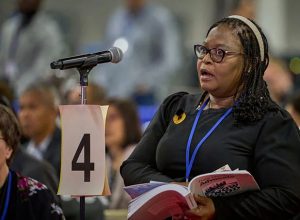
Molly Hlekani Mwayera, a lay delegate from the Zimbabwe East Conference, proposes an amendment to a revision of the Social Principles dealing with marriage during the May 2 afternoon plenary session of the United Methodist General Conference in Charlotte, N.C. (Photo by Paul Jeffrey, UM News)
Mwayera’s alternative made the Revised Social Principles acceptable to most delegates, resulting in the document’s adoption by a wide margin.
While removal of the LGBTQ bans has been widely hailed in the United States, the pastor of at least one large-membership congregation publicly has taken a stand against allowing same-sex weddings in his church.
Paul Rasmussen, senior pastor of Highland Park United Methodist Church located adjacent to the central Dallas campus of Southern Methodist University, announced after General Conference that he would exercise an option not to allow same-sex weddings. The option not to hold same-sex weddings stems from a United Methodist policy that gives pastors the authority to decide who can marry in the churches to which they are appointed.
Highland Park is known as one of the “cathedral churches” of United Methodism, both for its ornate architecture and for the prominence of many of its members and attendees including former U.S. President George W. Bush and his wife, Laura. United Methodist-related Perkins School of Theology conducted its 2024 graduation ceremony at Highland Park UMC May 11.
In a video on the church website, Rasmussen said the change adopted by General Conference “is neither an invitation nor a mandate for us to change from the church that we have always been.” He added that pastors on Highland Park’s staff wouldn’t be prevented from officiating at same-sex weddings at venues other than the church.
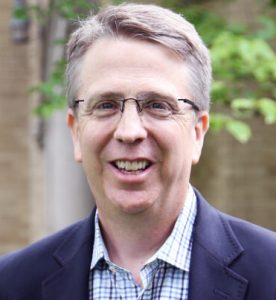
Paul Rasmussen
Rasmussen said Highland Park upholds the traditional definition of marriage as a union between a man and a woman. He also said the church would have a say on whether to accept the possible appointment of a same-sex-married pastor. (In the United Methodist system, pastors are appointed by bishops, rather than called by a church as in the Baptist congregational system).
U.S. United Methodist bishops have issued pastoral letters and videos explaining the removal of LGBTQ bans doesn’t compel churches to hold same-sex weddings or to accept LGBTQ clergy.
A plan to restructure the denomination internationally, known as regionalization, would give local autonomy to church regions to decide operating rules and mission priorities corresponding to their cultural contexts. The plan requires adoption of several constitutional amendments and would result in regional conferences set up roughly geographically, including the United States. The initial impetus for regionalization came from United Methodists outside the United States to decentralize U.S. church issues from global decision-making.
The United Methodist Council of Bishops has pledged to support adoption of the regionalization constitutional amendments. According to a May 7 press release, over the next two years the bishops will:
- “Offer resources and opportunities for conversations about regionalization and its necessary amendments.”
- “Vigorously support the passage of needed amendments through teaching and preaching.”
- “Prohibit the spread of misinformation about regionalization by United Methodists or external church and political entities.”
The last item refers to a two-year campaign by traditionalists, especially the Wesleyan Covenant Association and the Good News caucus, to mischaracterize the intent and implementation of worldwide regionalization. The bishops’ press release didn’t specify how they intend to enforce prohibitions against misinformation, which has been documented as a key tactic by traditionalists that resulted in the departure of more than 7,500 U.S. churches from United Methodism since 2019.
Related articles:
And also with the UMC: Where doctrine ends and culture begins | Analysis by Mark Wingfield
UMC delegates remove ban on LGBTQ clergy by consensus vote
UMC General Conference removes much of LGBTQ restrictions in consensus vote
UMC gives first approval to restructuring plan

